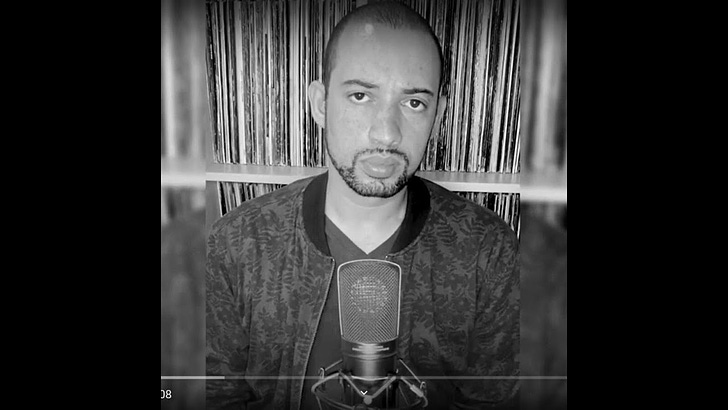Nick Eziefula: “I’m a guest, but never fully at home”
The law partner on how language can be limiting, not being seen as Black and forging his own identity
Hi, welcome back to Mixed Messages! This week I’m speaking to musician and lawyer Nick Eziefula, who is of English and Nigerian heritage. Nick is one of 40 people in the inaugural year of the PRS Foundation’s POWER UP network, an initiative launched to address anti-Black racism and racial disparities in the music sector. I was excited to hear Nick’s story – read it below.
How do you define your ethnicity?
I say mixed heritage and then explain that I’m of mixed-English and Nigerian heritage. Sometimes I get more specific and say I’m of Igbo heritage. Nigerian people are curious as to which ethnic group or culture I’m from.
You look quite ambiguous – how does that affect you?
I’ve been greeted with ‘as-salamu alaykum’, when visiting friends in Cyprus people think I’m Cypriot, I’ve also had Egyptians not willing to accept that I’m not Egyptian! When I get mistaken for other cultures, I get a warm feeling of acceptance, something I’ve so often longed for.
At the same time, I’ve always struggled with not feeling fully part of a particular culture. I’m a guest, but never fully at home. That’s unsettling and uncomfortable.
How do you connect to your culture?
Through music, especially in regards to my Black heritage, but also through my Igbo family and food. I remember my father forcing us to eat spicy food, and at family gatherings I’m the first to get to the buffet and take a tupperware home.
Do you find that you naturally connect with other mixed people?
There is a strong affinity with mixed people, no matter their mix. They fully understand me, whereas my Black friends might not quite understand my white heritage, or what it’s like to be part of both.
How do you feel about the language used to talk about mixed people?
Race is a bit of a false social construct; it’s a way of delineating people as ‘non-white’. I wish we didn’t have this need to describe things. I’m as black as I am white genetically, so it is odd that I would identify as a Black man but wouldn’t identify as a white man. Our language is so binary and limiting – it’s quite an antiquated and racist way of viewing the world.
Does being mixed influence the way you practice law?
The law is all about expressing complex concepts and reducing that down to language that needs to be interpreted. Our job is to be as clear and specific as possible, but you have to look at things from different points of view – that’s something I’ve done as I’ve grown up, looking at the world from multiple perspectives. I think it’s equipped me for this job.
Who do you think speaks interestingly about being mixed right now?
Ben Bailey Smith (known as Doc Brown) and his sister Zadie Smith have both been inspiring to me. Ben is my unofficial brother, he opened my mind up to a lot of issues to do with mixed heritage in a way that I hadn’t really explored before. White Teeth also caused me to think a lot about identity.
In the hip hop scene, I love Loyle Carner and Akala, whose book, Natives, was particularly eye-opening.
How would you like the conversation around being mixed to change?
I’m not a fan of colourism within the Black community. I find it offensive to be seen as ‘not really Black’ because I’m mixed-race. There is a level of white privilege, but I find it frustrating and alienating. I think it weakens the Black community, and that it’s the result of oppression.
What’s the best thing about being mixed?
The privilege of being a part member of lots of stuff. I can understand things, people and places on a broader level, which has been influenced by my mixed heritage. I think being mixed gives you a nuanced and sophisticated perspective, which is a superpower and a real blessing in my life.
Can you sum up your mixed experience in a word?
Self-determination. I’ve been forced to find ways to define, understand and even create my own identity.
Listen to Nick’s music here. Next week, I’ll be talking to Charlie Sibbick, founder and curator at Purslane Art. Subscribe to get Mixed Messages in your inbox on Monday, and follow Mixed Messages on Instagram to be the first to hear about our incredible first anniversary giveaway!
Enjoy Mixed Messages? Support me on Ko-Fi so I can continue to grow this newsletter! My goal is to amplify the newsletter for the first anniversary of Mixed Messages.
Mixed Messages is a weekly exploration of the mixed-race experience, from me, Isabella Silvers. My mom is Punjabi Indian (by way of East Africa) and my dad is White British, but finding my place between these two cultures hasn’t always been easy. That’s why I started Mixed Messages, where each week I’ll speak to a prominent mixed voice to delve into what it really feels like to be mixed.







"I’m not a fan of colourism within the Black community. I find it offensive to be seen as ‘not really Black’ because I’m mixed-race." I agree, I'm Black and I found a new kind of "racism" in Africa that I never thought about before, and which explains why while I would always use the "full Black" emoji on WhatsApp, my family in Africa would instead use the "Black but not too Black" emoji instead. (...I don't know how else to describe it, it's not meant to be offensive.)
I came to understand that the reason why I choose the "full Black" emoji is to express that, in Europe where I live, I am Black, period. How dark my Black complexion is has no impact on how I am perceived as a Black man. On the other hand, in Africa or at least in the country am I from, being "too Black" is badly perceived, and that's why my family instead uses the "Black but not too Black" emoji, as to not be part of the "Blacker" class that is looked down upon there.